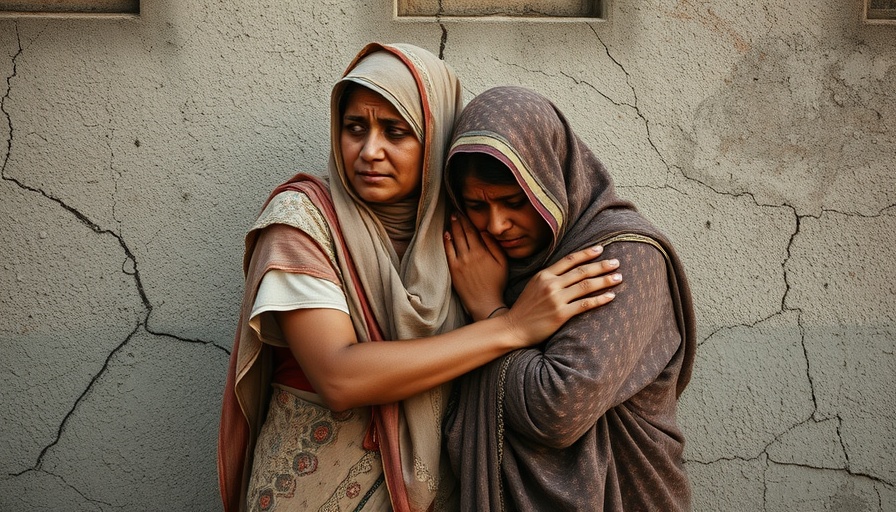
Chilling Realities of the Line of Control
The Line of Control (LoC) between India and Pakistan is not just a demarcation of territory; it embodies the fragile balance within one of the world's most dangerous geopolitical landscapes. With ongoing conflicts giving rise to humanitarian crises, the LoC serves as a reminder of the severe human toll wars inflict on ordinary civilians. Those who live along the LoC bear the scars of conflict, as recent shelling has left communities devastated on both sides.
Edge of Conflict: The Persistent Threat
After the recent attack in Pahalgam, the fragile peace along the LoC shattered once again, illustrating the precariousness of a ceasefire that has often failed. Reports indicate that at least 16 individuals have lost their lives on the Indian side, while Pakistan claims approximately 40 civilian deaths. This spiraling cycle of violence poses a grave threat not only to people but also to the very fabric of society, leaving lives in ruins.
The Human Cost of Militarization
People like Anam Zakaria, a Canadian-based Pakistani writer, shed light on the daily life of those impacted by this ongoing conflict. The burden of military operations and shelling forces families into makeshift bunkers, leading to loss of livestock, homes, and countless dreams for a peaceful future. Each shell that explodes represents a home shattered and a life disrupted, making it painfully clear that the LoC is an area riddled with despair.
A Historical Perspective on the LoC
The LoC, stretching approximately 740 kilometers, evolved from the Ceasefire Line established in 1949 following the first war between India and Pakistan. Subsequent agreements have failed to resolve underlying tensions, leaving Kashmirans caught in a deadly tug-of-war. Echoing the sentiments of Sumantra Bose, a political professor at the London School of Economics, it's evident that the LoC symbolizes borders drawn in conflict, disregarding the voices of Kashmiri people.
Ceasefire Dynamics at Play
Ceasefires may appear to offer temporary tranquility, but experts like Happymon Jacob signal that violations are an unending cycle. They can erupt from minor miscommunications or lead to significant incursions aimed at altering territorial control. The complexity of geopolitical interests and national pride stymies peace initiatives, perpetuating a cycle that leaves civilians in distress, as military actions become the norm rather than the exception.
Seeking Long-term Solutions
The stakes are undeniably high in Kashmir. As both nations increase their military presence, the need for dialogue becomes crucial. Human rights organizations and advocates argue for the inclusion of local voices in discussions about Kashmir's future, pushing back against decisions made without the input of those living in its shadow. Striking a balance between security and civil rights is paramount to paving the way for sustainable peace.
Parallel Conflicts Worldwide
The LoC isn't isolated in its nature. Conflicts with similar dynamics can be found elsewhere, notably the Green Line separating Israel and the West Bank. Here as well, territorial disputes manifest in human suffering and humanitarian crises. Recognizing these parallels can help frame the conflict in Kashmir within a global context, emphasizing shared struggles for peace and resolution.
The Role of International Stakeholders
Global powers play an influential role in mediating or exacerbating tensions in the region. A focused international response, encompassing diplomatic efforts rather than military posturing, might yield more effective results. The ongoing humanitarian crises require urgent international attention, revealing an opportunity for countries worldwide to collaborate on a peaceful resolution.
Conclusion: Call for Global Awareness
The situation along the LoC highlights the urgent need for inclusive dialogue, international intervention, and a commitment to bearing witness to the lives shattered by war. As working men and women, remaining informed about these global updates equips us to advocate for change and support those whose voices often go unheard.
Stay tuned for more in-depth coverage on this and other pressing international news. Knowledge is power, and our awareness can spark conversations that lead to action towards lasting peace.
 Add Row
Add Row  Add
Add 




 Add Row
Add Row  Add
Add 

Write A Comment